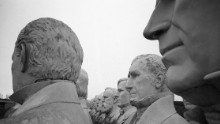The U.S. presidential graveyard:
Intriguing end for lifelike sculptures
In a field in Williamsburg, Virginia, a ghostly army of U.S. presidents appears buried chest-deep, as if caught in a nightmarish quicksand.
 George
Washington's nose -- or what's left of it -- struggles to stay attached
to his crumbling concrete face. Stains streak from his dead eyes like
tears. The back of his head is a battered mess of exposed metal rods.
George
Washington's nose -- or what's left of it -- struggles to stay attached
to his crumbling concrete face. Stains streak from his dead eyes like
tears. The back of his head is a battered mess of exposed metal rods.
Welcome
to intriguing remains of America's Presidents Park, the failed museum
where visitors once walked among 43 eerily lifelike busts of the
nation's leaders.
More than five years
after the sculpture park closed, its hefty 20ft presidents remain
clustered together on Howard Hankins' nearby farm.
The
concrete businessman, who helped build the original sculpture park,
couldn't bear to see the stony-faced men destroyed when the tourist
attraction closed in 2010, and instead moved them to his own property.
He now hopes to restore the busts to their former glory and exhibit them in a new museum -- which would also feature President Barack Obama and previous First Ladies.
Photographer Patrick Joust traveled to the farm to document the dilapidated monuments, finding that the more famous the president -- the greater the decay.
"The ones that had a large amount of decay included Woodrow Wilson and Abraham Lincoln," he added.
"Funnily enough, a lot of the lesser-known presidents seemed better preserved."
Joust
also brought his two-year-old son on the photoshoot and was struck by
the way the youngster, who didn't recognize the stern presidents, took a
more playful approach.
"I was always
fascinated by the kitschy nature of the statues," explained Joust.
"Finding them in a somewhat forlorn place, crumbling away, had obvious
symbolism.
"It seemed to symbolize the crumbling state of the 'Great Man' narrative that we use to simplify and obfuscate history."
With around $240 of Hankins' $500,000 campaign raised at time of writing, whether these great men will rise again, remains to be seen.










0 comments:
Post a Comment